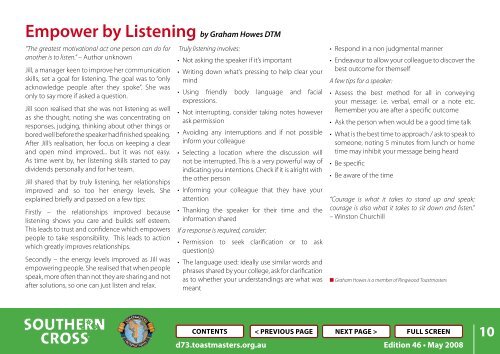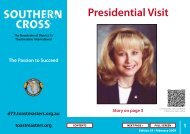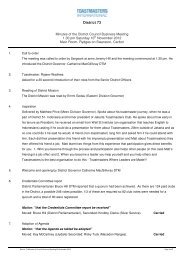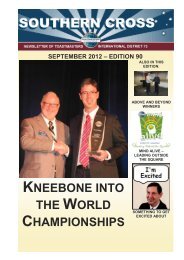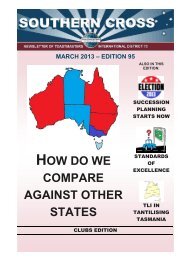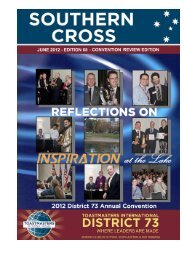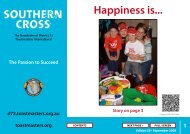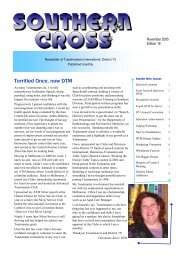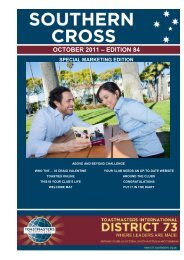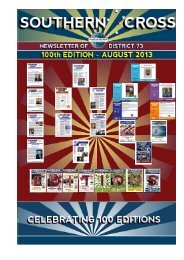May 2008 - District 73 Toastmasters
May 2008 - District 73 Toastmasters
May 2008 - District 73 Toastmasters
Create successful ePaper yourself
Turn your PDF publications into a flip-book with our unique Google optimized e-Paper software.
Empower by Listening by Graham Howes DTM<br />
“The greatest motivational act one person can do for<br />
another is to listen.” – Author unknown<br />
Jill, a manager keen to improve her communication<br />
skills, set a goal for listening. The goal was to “only<br />
acknowledge people after they spoke”. She was<br />
only to say more if asked a question.<br />
Jill soon realised that she was not listening as well<br />
as she thought, noting she was concentrating on<br />
responses, judging, thinking about other things or<br />
bored well before the speaker had finished speaking.<br />
After Jill’s realisation, her focus on keeping a clear<br />
and open mind improved... but it was not easy.<br />
As time went by, her listening skills started to pay<br />
dividends personally and for her team.<br />
Jill shared that by truly listening, her relationships<br />
improved and so too her energy levels. She<br />
explained briefly and passed on a few tips:<br />
Firstly – the relationships improved because<br />
listening shows you care and builds self esteem.<br />
This leads to trust and confidence which empowers<br />
people to take responsibility. This leads to action<br />
which greatly improves relationships.<br />
Secondly – the energy levels improved as Jill was<br />
empowering people. She realised that when people<br />
speak, more often than not they are sharing and not<br />
after solutions, so one can just listen and relax.<br />
Truly listening involves:<br />
• Not asking the speaker if it’s important<br />
• Writing down what’s pressing to help clear your<br />
mind<br />
• Using friendly body language and facial<br />
expressions.<br />
• Not interrupting, consider taking notes however<br />
ask permission<br />
• Avoiding any interruptions and if not possible<br />
inform your colleague<br />
• Selecting a location where the discussion will<br />
not be interrupted. This is a very powerful way of<br />
indicating you intentions. Check if it is alright with<br />
the other person<br />
• Informing your colleague that they have your<br />
attention<br />
• Thanking the speaker for their time and the<br />
information shared<br />
If a response is required, consider:<br />
• Permission to seek clarification or to ask<br />
question(s)<br />
• The language used: ideally use similar words and<br />
phrases shared by your college, ask for clarification<br />
as to whether your understandings are what was<br />
meant<br />
• Respond in a non judgmental manner<br />
• Endeavour to allow your colleague to discover the<br />
best outcome for themself<br />
A few tips for a speaker:<br />
• Assess the best method for all in conveying<br />
your message: i.e. verbal, email or a note etc.<br />
Remember you are after a specific outcome<br />
• Ask the person when would be a good time talk<br />
• What is the best time to approach / ask to speak to<br />
someone, noting 5 minutes from lunch or home<br />
time may inhibit your message being heard<br />
• Be specific<br />
• Be aware of the time<br />
“Courage is what it takes to stand up and speak;<br />
courage is also what it takes to sit down and listen.”<br />
– Winston Churchill<br />
n Graham Howes is a member of Ringwood <strong>Toastmasters</strong><br />
d<strong>73</strong>.toastmasters.org.au<br />
Edition 46 • <strong>May</strong> <strong>2008</strong><br />
10


